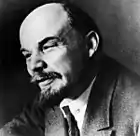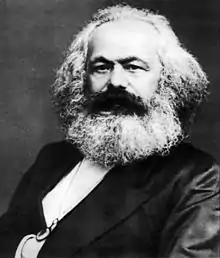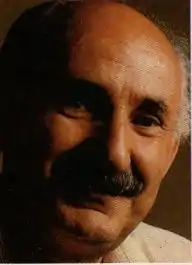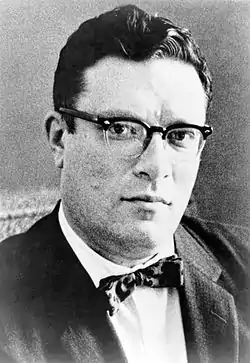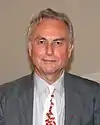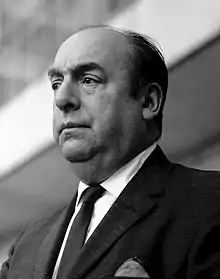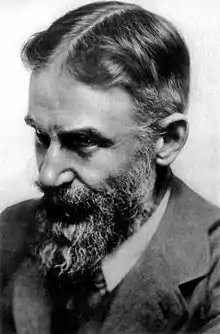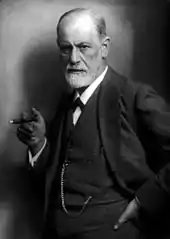Ateist olduğu bilinen kişiler listesi
A
- Amartya Kumar Sen (d. 1933), 1998 Nobel Ekonomi Ödülü sahibi Hint ekonomist.[1][2][3][4]
- Alan Turing (1912–1954), İngiliz matematikçi. Modern bilgisayar biliminin kurucusu.[5][6]
- Ali Nesin (1959-): Türk matematikçi.
- Aziz Nesin (1915-1995), Türk yazar.
- Adithya (1974-) Tamilce ve Malayalamca filmlerde rol alan Hint aktör.[7]
- Adalet Ağaoğlu (1929-2020): Türk yazar.
- Alejandro Amenábar (1972): İspanyol asıllı yönetmen.[8]
- Adam Carolla[9][10]
- Asia Carrera[11]
- Adrianne Curry[12]
- Ali Demirsoy (1945-): Türk biyolog, entomoloji ve entomoloji dalında evrimsel biyoloji uzmanı.
- Arnaud Denjoy (1884–1974): Fransız matematikçi[13]
- Andrew Denton[14]
- Alan Davies [15]
- Albert Einstein[16]
- Amanda Donohoe [17]
- Albert Ellis (1913–2007): Amerikalı psikolog.[18].
- Ayşe Hür (1956-): Türk araştırmacı yazar.
- Alfred Kinsey (1894–1956): Amerikalı biyolog, zooloji profesörü.[19]
- Ali Mehmet Celâl Şengör (1955-): Türk jeolog, profesör.[20]
B
- Bruce Lee (1940 - 1973)[21][22]
- Bill Maher[23]
- Brandy Alexandre[24]
- Brannon Braga[25]
- Billy Connolly [26]
- Ben Elton[27][28]
- Beverly Halstead (1933–1991): İngiliz paleontolog.[29]
- Barbaros Şansal (1957-): Türk moda tasarımcısı.
- Brad Pitt (1963-), Amerikalı oyuncu
C-Ç
- Can Yücel (1926-1999): Türk şair.
- Claude Shannon (1916–2001): Amerikalı elektrik mühendisi, matematikçi.[30]
- Christer Fuglesang (1957–), İsveçli astronot ve fizikçi.[31]
- Charlie Brooker[32]
- Christopher Eccleston[33]
D
- David Sloan Wilson (1949–): Amerikalı evrim biyoloğu.[34]
- Derek J. de Solla Price (1922–1983): Britanyalı-Amerikan bilim tarihçisi.[35]
- Douglas Adams (1952-2001): İngiliz bilimkurgu yazarı.[36]
- Daniel Radcliffe (1989-): İngiliz oyuncu.[37]
- Derren Brown
- David Cronenberg[38]
- David Cross[39]
- David Edgar [40]
- Desmond Morris (1928–): İngiliz zoolog ve etnolog [41][42]
E
- Eleazar Sukenik (1889–1953): İsrailli arkeolog. Kudüs İbrani Üniversitesi profesörü.[43]
- Elizur Wright (1804–1885): Amerikalı matematikçi.[44]
- Ertuğrul Kürkçü (1948–): Sosyalist aktivist, yayıncı ve yazar.[45]
- E. T. 'Teddy' Hall (1924–2001): İngiliz arkeolog.[46]
- Erdoğan Aydın (1957-): Türk tarih araştırmacısı, gazeteci, yazar.
- Edward Battersby Bailey (1881–1965): İngiliz jeolog, Britanya Jeoloji Akademisi’nin yöneticisi.[47]
- Erich Fromm (1900–1980): Yahudi kökenli Alman sosyal psikoloji uzmanı, filozof.[48]
- Eva Green (1980–)[49]
- Ernst Mayr (1904–2005): Taksonomist, tropikal kâşif, bilim tarihçisi, doğacı.[50]
F
- Francis Perrin (1901–1992): Fransız fizikçi.[51]
- Fazıl Say (1970-): Türk müzisyen, piyanist, besteci.
- Frank J. Tipler (1947–): Amerikalı fizik ve matematik profesörü.[52]
- Félix Le Dantec (1869–1917): Fransız biyolog.[53]
- Frédéric Joliot-Curie (1900–1958): Nobel Ödülü sahibi Fransız fizikçi.[54][55]
- Fikret Kızılok (1946-2001): Türk rock müziği sanatçısı.
- Fred Armisen[56]
- Frank Close (1845–1879): İngiliz fizikçi. Oxford Üniversitesi’nde fizik profesörü.[57]
- Francis Crick (1916–2004): İngiliz moleküler biyolog, fizikçi. 1953’te DNA moleküllerini bulan kişidir. Nobel Ödülü sahibidir.[58][59][60][61][62][63][64]
- Frances Farmer[65]
- Fritz Müller (1821–1897): Alman biyolog. Evrim teorisyenlerinden.[66]
G
- Gün Zileli (1946-): Türk anarşist yazar, çevirmen.
- G. H. Hardy (1877–1947): İngiliz matematikçi.[67][68]
- George Carlin[69][70]
- Guillermo del Toro[71]
- Gherman Titov (1935–2000): Sovyet astronot. Dünya yörüngesine çıkan ikinci insan.[72]
H
- Hermann Joseph Muller (1890–1967): Amerikalı genetikçi, eğitimci. 1946 Nobel Ödülü sahibi.[73]
- H. Christopher Longuet-Higgins (1923–2004): İngiliz kimya teorisyeni.[74]
- Halil Berktay (1947-): Türk tarihçi.
- Hermann Bondi (1919–2005): Avusturyalı kozmolog. Büyük patlama teorisine karşı sunulan durağan durum teorisinin savunucusu.[75][76]
- Howard Dalton (1944–2008): İngiliz mikrobiyolog[77]
- Harold Kroto (1939 - 2016), 1996 Nobel Ödülü sahibi kimyacı.[78]
- Hugh Laurie[79]
I-İ
- İlhan Arsel (1920-2010): Türk anayasa hukukçusu, araştırmacı, senatör.
- Ivan Pavlov (1849–1936): Nobel Ödülü sahibi Rus fizyolog, psikolog ve hekim.[80]
J
- John Allen Paulos (1945–): Matematik profesörü.[81]
- James D. Watson (1928–): DNA yapısı hakkında yaptığı çalışmalarla 1962 Nobel Ödülü’nün sahibi.[82][83]
- Jeff Medkeff (1968–2008): Amerikalı astronomi bilgini.[84]
- Jonathan Miller(1934–): Britanyalı fizikçi, aktör, tiyatrocu ve operacı, tv sunucusu. 2004’te televizyonda 'Atheism: A Rough History of Disbelief (Ateizm: Şüphe Tarihinin bir Taslağı) adlı programı hazırladı ve sundu.[85][86]
- Jacques Monod (1910–1976): Fransız biyolog. 1965 Nobel Ödülü sahibi.[87]
- John Malkovich[88]
- John Maynard Smith (1920–2004): Britanyalı evrim biyoloğu ve genetikçi.[89]
- Jodie Foster[90]
- Joe Ahearne
- Jane Asher[91]
- Julius Axelrod (1912–2004): Amerikalı Nobel Ödülü sahibi biyokimyacı.[92]
- Joan Bakewell [93]
- Javier Bardem (1969-): İspanyol sinema oyuncusu.[94]
- Jim Broadbent
- John Leslie (1766–1832): İskoç matematikçi ve fizikçi.[95]
- Jonathan Haidt (c.1964–): Virginia Üniversitesi'nde psikoloji uzmanı.[96]
- Jeremy Brock[97]
- James Cameron[98]
- Jimmy Carr[99]
- Jeremy Clarkson[100]
- Sir Julian Huxley (1887–1975): İngiliz evrimsel biyolog.[101]
- Jim Cornette[102]
- John Doyle[103]
K
- Keanu Reeves [104]
- Keith Allen[105]
- Kevin Bacon (1958-): Amerikalı aktör.[106]
- Kari Byron[107][108]
- Kathy Griffin[109]
- Katharine Hepburn[110]
L
- Leonard Susskind (1940–): Amerikalı fizik teorisyeni, Stanford Üniversitesi’nde profesör. Süpersicim kuramının yaratıcısı.[111]
- Linus Torvalds (1969–): Finlandiyalı yazılım mühendisi. Bugün dünyada hızla yaygınlaşan Linux işletim sisteminin çekirdeğini yazan kişi.[112]
- Lewis Wolpert: Biyolog.[113]
- Linus Pauling (1901–1994): Amerikalı kimyacı. 1954 Nobel Kimya Ödülü’nü, 1962’de Nobel Barış Ödülü’nü kazandı.[114]
- Larry King[115]
- Luis Buñuel[116]
- Leon Festinger (1919–1989): Amerikalı sosyal psikoloji uzmanı.[117].
- Lancelot Hogben (1895–1975): İngiliz zoolog.[118]
M
- Mark Zuckerberg (1984–): Facebook kurucusu ve CEO'su.[119]
- Mîna Urgan (1915-2000): Türk yazar, filolog, çevirmen.
- Michael Smith (1932–2000): Kanada doğumlu Britanyalı biyokimyacı. 1993 Nobel Ödülü sahibi.[120]
- Mary Adams[121]
- Michelangelo Antonioni (1912-2007): İtalyan film yönetmeni.[122]
- Massimo Pigliucci (1964–): Stony Brook Üniversitesi'nde evrim ve çevre bilimi profesörü.[123]
- Murat Belge (1943-): Türk yazar, çevirmen, siyasi aktivist.
- Matthew Turner (ö. 1789?): Kimyager.[124][125]
- Matthew Chapman[126]
- Mackenzie Crook[127]
- Marie Curie (1867–1934): Nobel fizik ve kimya ödüllü fizikçi.
- Marlene Dietrich [128]
- Matt Smith[129]
N
- Norman Pirie (1954–): Britanyalı biyokimyacı. DNA ve RNA çalışmaları yapıyor..[130]
- Nicholas Humphrey (1943–): Britanyalı psikolog.[131]
- Noël Coward[132]
- Natalie Dormer [133]
O-Ö
- Oliver Sacks (1933–): Amerikalı nöroloji uzmanı.[134]
- Orla Brady[135]
P
- Peter D. Mitchell (1920–1992): 1978 Nobel Ödülü sahibi biyokimyacı.[136]
- Phillip Adams[137]
- Peter Atkins (1940–): İngiltere’de Oxford‘da kimya profesörü.[138]
- Patrick Bateson (1938–): İngiliz biyolog ve bilim yazarı, Cambridge Üniversitesi’nde profesör ve Londra Zooloji Topluluğu başkanı.[139]
- Pelin Batu (1978-): Türk oyuncu, şair ve tarihçi.[140]
- Peter Medawar (1915–1987): Psikolog. Nobel Psikoloji Ödülü sahibi.[141]
- Paul Bettany (1971-): İngiliz aktör.[142]
- Patrick Blackett (1897–1974): Nobel Fizik Ödülü sahibi.[143]
- Paul D. Boyer (1918–2018): Amerikalı biyokimyacı .[144]
- Philip Jack Brooks (CM Punk) (1978–): Profesyonel güreşçi.
- PZ Myers (1957–): Amerikalı biyoloji profesörü.[145]
- Peter Caffrey[146]
- Phyllis Diller[147]
- Paul Giamatti[148]
- Peter Higgs (1929–): Britanyalı fizik teorisyeni.[149]
- Paul Nurse (1949–): 2001 Nobel Ödülü sahibi.[150]
- Pablo Picasso
R
- Robert Altman (1925-2006): Amerikalı yönetmen.[151]
- Robert Bresson[152][153]
- Ruth Mack Brunswick (1897–1946): Amerikalı psikolog.[154]
- Richard Carleton[155]
- Rodney Dangerfield[156]
- Rob Reiner [157]
- Richard J. Roberts (1943–): Britanyalı biyokimyacı, moleküler biyolog. 1993’te tıp alanında Nobel Ödülü kazandı.[158][159][160]
- Ronald Plasterk (1957–): Moleküler genetikçi.[161]
- Roman Polanski
- Russell T Davies[162]
- Richard Dawkins (1941–): İngiliz zoolog, biyolog, Oxford’da profesör. Yazdığı kitaplar Batı dünyasında en çok satanlar arasına girdi. Ateizmin önde gelen savunucularındandır.[163]
- Richard Feynman (1918–1988): Amerikalı fizikçi. 1965 Nobel Fizik Ödülü sahibi.[164][165]
- Ricky Gervais (1984-): İngiliz komedyen.
- Richard Leakey (1944–): Kenyalı paleontolog, arkeolog ve çevreci.[166]
- Richard Stallman (1953–): Amerikalı bilgisayar uzmanı, aktivist, yazılım uzmanı.[167]
- Robert Sapolsky (1957–): Stanford Üniversitesi’nde profesör.[168]
- Raymond Tallis (1946–): Filozof.[169]
S-Ş
- Sarah Bernhardt (1844-1923): Fransız tiyatro oyuncusu.[24]
- Susan Blackmore (1951–): İngiliz psikolog.[170]
- Sean M. Carroll (1956–): Amerikalı kozmolog.[171]
- Subrahmanyan Chandrasekhar (1910–1995): Nobel Fizik Ödülü sahibi astrofizikçi.[172]
- Scott Clifton[173]
- Stanley Donen
- Stanley Kubrick[174]
- Sergei Eisenstein[175][176]
- Sigmund Freud (1856–1939): Yahudi kökenli Avusturyalı psikolog, Psikanalizin kurucusu.[177]
- Stephen Jay Gould (1941–2002): Amerikalı paleontolog, biyolog ve bilim tarihçisi.[178]
- Susan Greenfield, Baroness Greenfield, (1950–): İngiliz bilim insanı.[179]
- Serra Yılmaz (1954-): Türk tiyatro, sinema ve dizi oyuncusu, çevirmen.
- Steven Pinker (1954–): Kanadalı psikolog.[180]
- Steven Rose (1938–): Londra Üniversitesi'nde biyoloji profesörü.[181]
- Steve Wozniak (1950–): Amerikalı bilgisayar mühendisi, Apple çalışanı.[182]
- Sevan Nişanyan (1956-)[183]
- Steven Weinberg (1933–): Amerikalı fizik teorisyeni. 1979 Nobel Fizik Ödülü sahibi.[184][185][186]
- Steve Jones (1944–): Britanyalı genetik profesörü.[187]
- Sasha Grey (1988–)[188][189]
- Sir James Hall (1761–1832): İskoç jeolog ve kimyacı.[190]
- Sam Harris (1967–): Amerikalı nörolog, filozof ve yazar.
- Stephen Hawking. Evren bilimci.[191][192].[193]
T
- Terence Davies[194]
- Turan Dursun (1934-1990)
- Theo van Gogh (1957–2004)[195]
V
- Victor Weisskopf (1908–1972): Avusturya kökenli Amerikalı fizik teorisyeni.[196]
- Victor J. Stenger (1935–): Amerikalı fizik profesörü. Çalıştığı kurumlar.[197]
- Vitaly Ginzburg (1916–): Rus fizikçi. 2003 Nobel Fizik Ödülü sahibi.[198]
W
- W. Grey Walter (1910–1977): Amerikalı nörofizyolog.[199]
- Woody Allen (1935-): Amerikalı film yönetmeni, senaryo yazarı, aktör, stand-upçı, oyun yazarı, öykücü ve müzisyen.[200]
- Wil Anderson[201]
- William Kingdon Clifford (1845–1879): İngiliz matematikçi ve filozof.[202]
- William B. Davis[203]
Kaynakça
| Wikimedia Commons'ta Atheists ile ilgili ortam dosyaları bulunmaktadır. |
- "Reported lecture". 16 Ocak 2009 tarihinde kaynağından arşivlendi. Erişim tarihi: 30 Ağustos 2008.
- "Self-proclaimed". 26 Ekim 2006 tarihinde kaynağından arşivlendi. Erişim tarihi: 30 Ağustos 2008.
- "World Bank". 4 Haziran 2008 tarihinde kaynağından arşivlendi. Erişim tarihi: 30 Ağustos 2008.
- "Press meeting". 26 Temmuz 2008 tarihinde kaynağından arşivlendi. Erişim tarihi: 30 Ağustos 2008.
- "This loss shattered Turing's religious faith and led him into atheism..." Time 100 profile of Alan Turing 22 Ağustos 2008 tarihinde Wayback Machine sitesinde arşivlendi., p. 2
- "He was an atheist..." Alan Turing: Father of the computer 2 Şubat 2008 tarihinde Wayback Machine sitesinde arşivlendi., BBC News, 28 April 1999. Retrieved 11 June 2007.
- 'Thank god I'm an atheist! 27 Haziran 2018 tarihinde Wayback Machine sitesinde arşivlendi.', The Big Bang (Adithya's blog), 9 Nisan 2007 (1 Aralık 2007 tarihinde erişildi).
- " Though the crusaders in this film are actually Christian, Amenabar - who when pushed during the conversation Sunday said he was personally an atheist - said he had no particular present group in mind when making "Agora." " Brian Brooks, 'Amenabar: Not anti-Christian, but Crusading Against Fundamentalism with "Agora" 21 Mayıs 2009 tarihinde Wayback Machine sitesinde arşivlendi.', Indiewire.com, 18 May 2009 (accessed 26 May 2009).
- "Carolla talks about atheism". 26 Eylül 2007 tarihinde kaynağından arşivlendi. Erişim tarihi: 13 Kasım 2012.
- "Adam on Youtube: "I am an atheist. I know there is no god."". 18 Mart 2012 tarihinde kaynağından arşivlendi. Erişim tarihi: 13 Kasım 2012.
- "So me, the completely unsuperstitious atheist, goes and posts on a message board that 'no, I don't believe in bad luck on Friday the 13th'." "Asia Carrera's official website, bulletin for July 13, 2006". 13 Ağustos 2007 tarihinde kaynağından arşivlendi. Erişim tarihi: 13 Kasım 2012. (archived August 29, 2007)
- "The argument continued in the next episode, when atheist Adrianne, commenting on the apartment's cleanliness, said, 'The Christians think they're better than everybody and they're holier than thou. But I clean up their messes all the time.'" God and Woman at America's Next Top Model 11 Şubat 2006 tarihinde Wayback Machine sitesinde arşivlendi., John Bowman]
- "Denjoy was an atheist, but tolerant of others' religious views; he was very interested in philosophical, psychological, and social issues." "Denjoy, Arnaud", Complete Dictionary of Scientific Biography Vol. 17, p.219. Detroit: Charles Scribner's Sons, 2008.
- "Gentleman, frankly I'm an atheist,..."Enough Rope 17 Mayıs 2008 tarihinde Wayback Machine sitesinde arşivlendi.', 25 July 2005.
- 11 Mart 2013 tarihinde Wayback Machine sitesinde arşivlendi. retrieved August 16, 2008
- 18 Ekim 2012 tarihindeki 3Milyon dolarlık Ebay satışından sonra ünlenen mektubunda Einstein "Tanrı kelimesi benim için insan zayıflığının tanımı ve ürünü dışında hiçbir şey ifade etmez. İncil saygın ama ilkel efsanelerdir nitekim oldukça çocuksular. Ne türlü yorumlanırsa yorumlansın benim için bu değişmez. http://www.huffingtonpost.com/2012/10/24/einstein-god-letter-sold-for-just-over-3-million-anonymous-buyer_n_2012282.html 14 Ekim 2014 tarihinde Wayback Machine sitesinde arşivlendi.
- Biography of Amanda Donohoe 30 Kasım 2011 tarihinde Wayback Machine sitesinde arşivlendi., Internet Movie Database (accessed April 24, 2008).
- Nielsen, Stevan Lars & Ellis, Albert. (1994). "A discussion with Albert Ellis: Reason, emotion and religion", Journal of Psychology and Christianity, 13(4), Win 1994. pp. 327-341
- "Kinsey was also shown to be an atheist who loathed religion and its constraints on sex." 'Kinsey' critics ready 14 Şubat 2006 tarihinde Wayback Machine sitesinde arşivlendi., Cheryl Wetzstein, The Washington Times. Retrieved 2 February 2007.
- Bir televizyon programında bizzat kendi beyanı (http://www.youtube.com/watch?v=zALMPfp0C6I 28 Eylül 2014 tarihinde Wayback Machine sitesinde arşivlendi.)
- Little, John (1996). The Warrior Within - The philosophies of Bruce Lee to better understand the world around you and achieve a rewarding life (İngilizce). Contemporary Books. s. 128. ISBN 0-8092-3194-8.
- Little, John (1996). The Warrior Within - The philosophies of Bruce Lee to better understand the world around you and achieve a rewarding life (İngilizce). Contemporary Books. s. 122. ISBN 0-8092-3194-8.
- On a November 1, 2009 airing of Imus in the Morning when asked by Don Imus about rumors of marriage, Maher: "I said, well, tell them the truth, neither me nor my girl believe in God or marriage, so there is not going to be a big church wedding." When asked whether he thought Christopher Hitchens was a 7 on Dawkins' scale of 1–7 (1 being absolutely certain there is a God and 7 being absolutely certain there isn't, a scale on which Dawkins considers himself 6.9), Maher answered with: "He may be, I think we are all just talking semantics at some point, we are all atheists which means we don't believe in the deity, we don't believe in a magic spaceman, and that we think people who do, have a neurological disorder and they need help."
- Allen Smith, Warren (2002). Celebrities in Hell: A Guide to Hollywood's Atheists, Agnostics, Skeptics, Free Thinkers, and More (İngilizce). Barricade Books Inc. s. 130. ISBN 1-56980-214-9. 20 Ağustos 2020 tarihinde kaynağından arşivlendi. Erişim tarihi: 13 Eylül 2020.
- "Every religion has a mythology". Sidmennt, the Icelandic Ethical Humanist Association. 16 Ağustos 2006. 25 Temmuz 2015 tarihinde kaynağından arşivlendi. Erişim tarihi: 19 Aralık 2006.
- "Where do you go when you die? The same place you were before you were born; nowhere! It's over!" Billy Connolly Live: Was It Something I Said?, 2007
- BBC 'too scared to allow jokes about Islam' 6 Temmuz 2008 tarihinde Wayback Machine sitesinde arşivlendi., April 2, 2008. (Accessed April 3, 2008)
- "Elton described himself as an atheist but said he was in favour of God defined as "the mystery of the universe". His children attend a Church of England school and he said he attended church occasionally." BBC 'scared' of Islam jokes, says Elton 12 Kasım 2012 tarihinde Wayback Machine sitesinde arşivlendi., Guardian, April 2, 2008 (accessed April 3, 2008)
- "He and the Bishop of Oxford staged another version of the great debate between Thomas Henry ('Darwin's bulldog') Huxley and Bishop ('Soapy Sam') Wilberforce that followed the publication of Darwin's Origin Of Species. The present Bishop defended the new Darwinian orthodoxy, but Dr Halstead, an atheist, took the line that the former Bishop of Oxford had been quite right to oppose Darwin's thesis. But that too was entirely characteristic. He told me that he was a member of the Athenaeum only because it had a painting of Darwin in the lobby." Tim Radford, 'A passion for dinosaurs: Obituary of Beverly Halstead', The Guardian (London), 2 May 1991.
- "Shannon described himself as an atheist and was outwardly apolitical." William Poundstone, Fortune's Formula, Hill and Wang: New York (2005), page 18.
- Atlantseglaren från Bromma vill tänja gränsen mot rymden 16 Ekim 2007 tarihinde Wayback Machine sitesinde arşivlendi., Dagens Nyheter, December 10, 2006.
- 7 Eylül 2008 tarihinde Wayback Machine sitesinde arşivlendi.. The Guardian August 23, 2008
- "I'm an atheist. My mother is very religious, a churchgoer. She would often encourage me to go to church as well, but never forced it upon me, which I thought was quite decent of her. [...] There was no defining moment in which I decided there was no god for me, it was more of a growing process. I do feel that whatever religious beliefs I had as a child were foisted upon me. It's like when you ask where Grandma went when she died, and you'd be told that she went to heaven. I wouldn't necessarily view that as a bad thing, but it was stuff like that which I think hindered my intellectual development. Now that I've grown, I prefer a different interpretation." Christopher Eccleston, The Heaven and Earth Show, BBC1, Sunday April 3, 2005, 10:30.
- Angier, Natalie (24 Aralık 2002). "The Origin of Religions, From a Distinctly Darwinian View". New York Times. ss. F5. 16 Ekim 2007 tarihinde kaynağından arşivlendi. Erişim tarihi: 11 Haziran 2007.
...I don't believe in God. I tell people I'm an atheist, but a nice atheist.
- "...my father [Derek] was a British Atheist... from a rather well known Sephardic Jewish family..." de Solla Price, Mark (9 Aralık 2007). "Are you Jewish?". 28 Ağustos 2008 tarihinde kaynağından arşivlendi. Erişim tarihi: 1 Ağustos 2008.
- "I am a radical Atheist..." Adams in an interview by American Atheists 28 Aralık 2007 tarihinde Wayback Machine sitesinde arşivlendi..
- "I'm an atheist, but I'm very relaxed about it. I don't preach my atheism, but I have a huge amount of respect for people like Richard Dawkins who do. Anything he does on television, I will watch." Singh, Anita. "Daniel Radcliffe: a cool nerd 6 Temmuz 2009 tarihinde Wayback Machine sitesinde arşivlendi.", Daily Telegraph, 4 July 2009.
- "Cronenberg's parents were atheists who encouraged him to experiment spiritually, convinced that sooner or later he'd find his own path to godlessness. And he did. This lack of belief, which became a belief system in itself, informs so much of his work: the primacy of the body, the finality of death, the lack of consolation. "It was apparent to me that religion was an invented thing," he says, "a wish-fulfilment thing, a fantasy thing. It was much more real, dangerous, to accept that mortality was the end for you as an individual. As an atheist, I don't believe in an afterlife, so if you're thinking of murder, if your subject is murder, then that's a physical act of absolute destruction because you're ending something, a body, that is unique. That person never existed before, will never exist again, will not be karmically recycled, will not go to heaven, therefore I take it seriously." " Simon Hattenstone interviewing Cronenberg, 'Gentleman's relish 17 Şubat 2008 tarihinde Wayback Machine sitesinde arşivlendi.', The Guardian, October 6, 2007 (accessed June 9, 2008).
- http://www.avclub.com/articles/david-cross,13617/ 1 Ekim 2012 tarihinde Wayback Machine sitesinde arşivlendi. "He's coming at me with all this, saying that I'm a self-loathing Jew, and I said I was raised Jewish but I don't believe in God, I'm not Jewish, and I don't hold those beliefs." Accessed on 2009-08-24
- "Earlier this year David Edgar wrote an unforgettable account of the death of his wife, Eve Cook, for a BBC radio talk during Easter week. An avowed atheist, Edgar said that he was trying to express 'that most human need to tell the dead what we would want to say - but know we couldn't say - if they were still alive'." Sean French, 'Dust to dustjacket', The Guardian, April 30, 1999, Pg. 18.
- "[Religion] is not an easy subject to deal with, but as zoologists we must do our best to observe what actually happens rather than listen to what is supposed to be happening. If we do this, we are forced to the conclusion that, in a behavioural sense, religious activities consist of the coming together of large groups of people to perform repeated and prolonged submissive displays to appease a dominant individual. The dominant individual takes many forms in different cultures, but always has the common factor of immense power. [...] If these submissive actions are successful, the dominant individual is appeased. [...] The dominant individual is usually, but not always, referred to as a god. Since none of these gods exist in a tangible form, why have they been invented? To find the answer to this we have to go right back to our ancestral origins." Desmond Morris, The Naked Ape, p.178-179, Jonathan Cape, 1967.
- "Man's evolution as a neotenous ape has put him in a similar position to the dog's. He becomes sexually mature and yet he still needs a parent — a super-parent, one as impressive to him as a man must be to a dog. The answer was to invent a god — either a female super-parent in the shape of a Mother Goddess, or a male god in the shape of God the Father, or perhaps even a whole family of gods. Like real parents they would both protect, punish and be obeyed. [...] These — the houses of the gods — the temples, the churches and the cathedrals — are buildings apparently made for giants, and a space visitor would be surprised to find on closer examination that these giants are never at home. Their followers repeatedly visit them and bow down before them, but they themselves are invisible. Only their bell-like cries can be heard across the land. Man is indeed an imaginative species." Desmond Morris, The Pocket Guide to Manwatching, p.234-236 Triad Paperbacks, 1982.
- "I read a few sentences. It was written in beautiful Biblical Hebrew. The language was like that of the Psalms.' One of these was the Isaiah scroll, which I saw recently in the Rockefeller Museum in East Jerusalem: sections of goat-skin parchment, sewn together, 27 feet long. I felt in the presence of something numinous, although I have been a convinced atheist since boyhood. But this document is a testament to the inexplicable persistence of the human mind, in the face of all the evidence, in believing that we are on earth for a divine purpose." Eleazar Sukenik, quoted in Justin Cartwright, 'The indestructible power of belief', The Guardian, 27 May 2000, Saturday Pages, Pg. 3.
- In Abolitionist, Actuary, Atheist: Elizur Wright and the Reform Impulse, Wright's biographer Lawrence B. Goodheart describes him as "an evangelical atheist, an impassioned actuary, a liberal who advocated state regulation, an individualist who championed social cooperation, and a very private public crusader" (op. cit., page x)
- "Tanrı inancımın olmadığını, evrenin bir oluş ve yok oluş süreci içerisinde ilerlediğini, bunu açıklamak için bir Tanrı fikrine ihtiyaç olmadığını söylemekten kaçınmıyorum." 30 Mayıs 2012 tarihinde Wayback Machine sitesinde arşivlendi.
- "The three laboratories unanimously agreed that the cloth dated from between 1260 and 1390, a date consistent with its known history—but which demolished the notion of its being the burial shroud of Christ. Hall, who made no secret of his atheism, had no hesitation in enjoying the public attention that this definitive result attracted." Robert Hedges, 'Hall, Edward Thomas [Teddy] (1924–2001)' 24 Eylül 2015 tarihinde Wayback Machine sitesinde arşivlendi., Oxford Dictionary of National Biography, online edition, Oxford University Press, January 2005 (accessed 2 May 2008).
- "In religious matters he was an atheist." A.G. MacGregor: "Bailey, Edward Battersby", Complete Dictionary of Scientific Biography Vol. 1 p. 393. Detroit: Charles Scribner's Sons, 2008.
- "About the same time he stopped observing Jewish religious rituals and rejected a cause he had once embraced, Zionism. He "just didn't want to participate in any division of the human race, whether religious or political," he explained decades later (Wershba, p. 12), by which time he was a confirmed atheist." Keay Davidson: "Fromm, Erich Pinchas", American National Biography Online, Feb. 2000 (accessed 28 April 2008) .
- "I have no religion. I wasn't raised that way, and I have nothing now" - Eva Green to Total Film magazine. December, 2007.
- "An appreciation of biologist Ernst Mayr (1904-2005)". 27 Nisan 2012 tarihinde kaynağından arşivlendi. Erişim tarihi: 30 Ağustos 2008.
- "After retirement, he remained politically active, defending Andrei Sakharov, and was President of the French Atheists' Union." D S Bell, 'Obituary: Francis Perrin', The Independent (London), 18 July 1992, Pg. 44.
- Although an atheist, Tipler believes 'God' will eventually exist in the last moments of the universe:
"The theory is basically this: just as the Earth began with a Big Bang, so it will end, in a single point, which Tipler calls the Omega Point. And just as life on Earth began with a single cell which colonised the planet, so life at the end of time will, according to Tipler, "become omnipresent, omnipotent, and omniscient which are the three attributes of God". The Omega Point/God is the point of ultimate, infinite knowledge when the earth will be inhabited by beings who are, to all intents and purposes, computers. Tipler says they can be called beings because he defines life as information processing, as did the famous biologist Richard Dawkins, who called computers "biological objects". [...]
Tipler says his own viewpoint is that of an atheist. Though brought up a Christian fundamentalist, he rejected religion when he was 16, because the Church claimed the Earth was 6,000 years old, when he knew that it went back 4.6 billion years. [...]
Still, it seems excessively generous for the beings of the future to want to resurrect all of us. Tipler answers that they will be extremely intelligent beings, and therefore extremely curious, interested in all the variations that preceded them, from the very beginning, just as today's scientists are working to recreate the first single cell, in all its possible forms. "I think the evidence is very strong that this particular version of you and this particular version of me will actually be there in the future. It will be you and me emulated down to the atom." Why, he says, we might even end up repeating the whole interview." Megan Tressider, 'The Megan Tressider Interview: Meaning of life is, er, God and Omega; Physicist Frank J Tipler, an atheist, says he has found God', The Guardian (London), 18 March 1995, Features Pages, Pg. 27. - "Although an atheist, Le Dantec was always open to religious discussion. [...] Among his philosophical works are L'athéisme (Paris, 1907); " 'Le Dantec, Félix', Complete Dictionary of Scientific Biography. Vol. 8. Detroit: Charles Scribner's Sons, 2008, p. 124.
- "makingthemodernworld.org.uk". 5 Mart 2016 tarihinde kaynağından arşivlendi. Erişim tarihi: 30 Ağustos 2008.
- "Raised in a completely nonreligious family, Joliot never attended any church and was a thoroughgoing atheist all his life." Perrin, Francis: "Joliot, Frédéric", Complete Dictionary of Scientific Biography Vol. 7 p. 151. Detroit: Charles Scribner's Sons, 2008.
- "Arşivlenmiş kopya". 29 Mart 2012 tarihinde kaynağından arşivlendi. Erişim tarihi: 13 Kasım 2012.
- When describing a total solar eclipse, Close wrote: "It was simultaneously ghastly, beautiful, supernatural. Even for a 21st century atheist, the vision was such that I thought, "If there is a heaven, this is what its entrance is like." The heavenly vision demanded music by Mozart; instead we had the crickets." Frank Close, 'Dark side of the moon', The Guardian, 9 August 2001, Guardian Online Pages, Pg. 8.
- Francis Crick, What Mad Pursuit: a Personal View of Scientific Discovery, Basic Books reprint edition, 1990, ISBN 0-465-09138-5, p. 145.
- ""How I Got Inclined Towards Atheism"". 21 Mayıs 2012 tarihinde kaynağından arşivlendi. Erişim tarihi: 30 Ağustos 2008.
- Mark Steyn identify Crick as an atheist. See:The Twentieth-Century Darwin 9 Temmuz 2008 tarihinde Wayback Machine sitesinde arşivlendi. by Mark Steyn, published in The Atlantic Monthly, October 2004.
- "Francis Crick was an evangelical atheist."Francis Crick's Legacy for Neuroscience: Between the α and the Ω 10 Şubat 2009 tarihinde Wayback Machine sitesinde arşivlendi.
- "Instead, it is interlaced with descriptions of Crick’s vacations, parties and assertions of atheism — occasionally colorful stuff that drains the intellectual drama from the codebreaking."Genome Human 11 Haziran 2015 tarihinde Wayback Machine sitesinde arşivlendi.
- "There is Crick the mentor, Crick the atheist, Crick the free-thinker, and Crick the playful."Entertaining Dr Crick
- Crick, 86, said: "The god hypothesis is rather discredited." Do our genes reveal the hand of God? 4 Haziran 2008 tarihinde Wayback Machine sitesinde arşivlendi.
- "Arşivlenmiş kopya". 25 Ekim 2012 tarihinde kaynağından arşivlendi. Erişim tarihi: 13 Kasım 2012.
- "[Müller] was an atheist..." Review of Müller's biography 4 Haziran 2008 tarihinde Wayback Machine sitesinde arşivlendi., by James Mallet, Quarterly Review of Biology 79:196 (2004). Retrieved 2 July 2007.
- "Hardy... was a stringent atheist..." Hit Play on Ramanujan 16 Ekim 2007 tarihinde Wayback Machine sitesinde arşivlendi., by Lisa Drostova, East Bay Express, April 30 2003. Retrieved 7 October 2007.
- "The first Bombe to be delivered was named Agnus by Turing: a joke that atheist Hardy might have made..." Alan Turing — a Cambridge Scientific Mind 16 Mayıs 2008 tarihinde Wayback Machine sitesinde arşivlendi., by Andrew Hodges, Cambridge Scientific Minds (Cambridge University Press, 2002) Retrieved 2 July 2007.
- "Comedian George Carlin wins posthumous Grammy". Reuters. 8 Şubat 2009. 16 Mart 2009 tarihinde kaynağından arşivlendi. Erişim tarihi: 8 Şubat 2009.
- The following is extracted from George Carlin's HBO special, "You Are All Diseased", recorded live at New York City's Beacon Theater on February 6, 1999. "In the Bullshit Department, a businessman can't hold a candle to a clergyman. 'Cause I gotta tell you the truth, folks. When it comes to bullshit, big-time, major league bullshit, you have to stand in awe of the all-time champion of false promises and exaggerated claims, religion. No contest. No contest. Religion. Religion easily has the greatest bullshit story ever told. Think about it. Religion has actually convinced people that there's an invisible man living in the sky who watches everything you do, every minute of every day. And the invisible man has a special list of ten things he does not want you to do. And if you do any of these ten things, he has a special place, full of fire and smoke and burning and torture and anguish, where he will send you to live and suffer and burn and choke and scream and cry forever and ever 'til the end of time! But He loves you. He loves you, and He needs money! He always needs money! He's all-powerful, all-perfect, all-knowing, and all-wise, somehow just can't handle money! Religion takes in billions of dollars, they pay no taxes, and they always need a little more. Now, you talk about a good bullshit story. Holy Shit! But I want you to know something, this is sincere, I want you to know, when it comes to believing in God, I really tried. I really, really tried. I tried to believe that there is a God, who created each of us in His own image and likeness, loves us very much, and keeps a close eye on things. I really tried to believe that, but I gotta tell you, the longer you live, the more you look around, the more you realize, something is fucked up. Something is wrong here. War, disease, death, destruction, hunger, filth, poverty, torture, crime, corruption, and the Ice Capades. Something is definitely wrong. This is not good work. If this is the best God can do, I am not impressed. Results like these do not belong on the resume of a Supreme Being. This is the kind of shit you'd expect from an office temp with a bad attitude. And just between you and me, in any decently-run universe, this guy would've been out on his all-powerful ass a long time ago."
- "Arşivlenmiş kopya". 13 Mart 2010 tarihinde kaynağından arşivlendi. Erişim tarihi: 13 Kasım 2012.
- "Some say God is living there [in space]. I was looking around very attentively, but I did not see anyone there. I did not detect either angels or gods. ... I don't believe in God. I believe in man-his strength, his possibilities, his reason." Gherman Titov, comments made at World Fair, Seattle, Washington, 6 May 1962, reported in The Seattle Daily Times, 7 May 1962, p. 2.
- "Muller, who through Unitarianism had become an enthusiastic pantheist, was converted both to atheism and to socialism." Hermann Joseph Muller. 1890–1967, G. Pontecorvo, Biographical Memoirs of Fellows of the Royal Society, Vol. 14, Nov., 1968 (Nov., 1968), pp. 348-389 (Quote from p. 353) Retrieved 14 July 2007.
- "By that time Longuet-Higgins had become a convinced atheist, although he still respected many of the features of the Church of England." John Murrell, 'Higgins, (Hugh) Christopher Longuet- (1923–2004)' 24 Ocak 2016 tarihinde Wayback Machine sitesinde arşivlendi., Oxford Dictionary of National Biography, online edition, Oxford University Press, January 2008 (accessed 1 May 2008).
- "Since his childhood in Vienna Bondi had been an atheist, developing from an early age a view on religion that associated it with repression and intolerance. This view, which he shared with Hoyle, never left him. On several occasions he spoke out on behalf of freethinking, so-called, and became early on active in British atheist or "humanist" circles. From 1982 to 1999, he was president of the British Humanist Association, and he also served as president of the Rationalist Press Association of United Kingdom." Helge Kragh: "Bondi, Hermann", Complete Dictionary of Scientific Biography Vol. 19 p. 343. Detroit: Charles Scribner's Sons, 2008. Accessed via Gale Virtual Reference Library 27 Mayıs 2008 tarihinde Wayback Machine sitesinde arşivlendi. 29 April 2008.
- In a letter to the Guardian, Jane Wynne Willson, Vice-President of the British Humanist Association, added to his obituary: "Also president of the Rationalist Press Association from 1982 until his death, and with a particular interest in Indian rationalism, Hermann was a strong supporter of the Atheist Centre in Andra Pradesh. He and his wife Christine visited the centre a number of times, and the hall in the science museum there bears his name. When presented with a prestigious international award, he divided a large sum of money between the Atheist Centre and women's health projects in Mumbai." Obituary letter: Hermann Bondi 9 Haziran 2008 tarihinde Wayback Machine sitesinde arşivlendi., Guardian, 23 September 2005 (accessed 29 April 2008).
- "She advised him that he risked being called up, and suggested an unusual way to avoid the draft - by becoming a priest, one of the categories exempt from military service. Dalton discovered a little-known religious group called the Universal Life Church of California which for $25 would "ordain" anyone. He duly sent off a cheque and within days was delighted to learn that he was now a bona fide Minister of Religion. It became a running joke and his friends frequently addressed letters to the Reverend Howard Dalton; as a life-long atheist, he particularly relished the irony of his new title." 'Obituary of Professor Sir Howard Dalton, Microbiologist who became Defra's Chief Scientific Adviser just after the foot-and-mouth outbreak', Daily Telegraph 15 January 2008, Pg. 25.
- Harold Kroto claims to have four "religions": humanism, atheism, amnesty-internationalism and humourism. 9 Ocak 2010 tarihinde Wayback Machine sitesinde arşivlendi.
- "I don't believe in God, but I have this idea that if there were a God, or destiny of some kind looking down on us, that if he saw you taking anything for granted he’d take it away. So he'll be like: 'You think this is going pretty well?' Then he'll go and send down some big disaster." Stargazing: Heather's angry, Jane is ill, Hugh is anxious 3 Kasım 2007 tarihinde Wayback Machine sitesinde arşivlendi., Kansas City Star, Wed, Oct. 31, 2007 (accessed November 1, 2007).
- Asked by his follower E. M. Kreps whether or not he was religious, Kreps wrote that Pavlov smiled and replied: "Listen, good fellow, in regard to [claims of] my religiosity, my belief in God, my church attendance, there is no truth in it; it is sheer fantasy. I was a seminarian, and like the majority of seminarians, I became an unbeliever, an atheist in my school years." Quoted in George Windholz, 'Pavlov's Religious Orientation', Journal for the Scientific Study of Religion Vol. 25 No. 3 (Sep., 1986), pp. 320-327.
- Amazon listing 19 Kasım 2020 tarihinde Wayback Machine sitesinde arşivlendi. of Irreligion: A Mathematician Explains Why the Arguments for God Just Don't Add Up.
- Watson is identified as an atheist by his acquaintance, Rabbi Marc Gellman. Trying to Understand Angry Atheists: Why do nonbelievers seem to be threatened by the idea of God? 1 Mayıs 2006 tarihinde Wayback Machine sitesinde arşivlendi., by Rabbi Marc Gellman, Newsweek, 28 April 2006. Retrieved 11 November 2006.
- When asked by a student if he believed in God, Watson replied "Oh, no. Absolutely not... The biggest advantage to believing in God is you don't have to understand anything, no physics, no biology. I wanted to understand." JoAnne Viviano (19 Ekim 2007). "Nobel Prize-winning scientist wows some, worries others". The Vindicator. 28 Haziran 2006 tarihinde kaynağından arşivlendi. Erişim tarihi: 19 Ekim 2007.
- "I met Jeff at The Amazing Meeting 5.5 in Fort Lauderdale in January. We became friends and I read his blog within hours of each posting. He was a programmer, an astronomer, a pro-bono science educator, a hard-nosed skeptic and an atheist. This random blow against a friendly and generous guy is a typical example of the non-plannedness of things." Martin Rundkvist, Jeff Medkeff 1968-2008 6 Ocak 2009 tarihinde Wayback Machine sitesinde arşivlendi., Aardvarchaeology blog, 4 August 2008 (accessed 5 August 2008).
- A Rough History of Disbelief 28 Eylül 2008 tarihinde Wayback Machine sitesinde arşivlendi. Official BBC site describing the series
- On the filming of The Atheism Tapes with Jonathan Miller: "We had been friends for a number of years, and had discussed a great many topics, but we had never, except glancingly, ever spoken about religion. We knew about our shared atheism, but the subject didn't seem to warrant much attention; in the Miller-McGinn world it was a non-existent topic. [...] It is often forgotten that atheism of the kind shared by Jonathan and me (and Dawkins and Hitchens et al) has an ethical motive." Atheism Tapes 5 Ekim 2008 tarihinde Wayback Machine sitesinde arşivlendi., Colin McGinn, on his blog. (Accessed 1 April 2008)
- "In his final chapter de Duve turns to the meaning of life, and considers the ideas of two contrasting Frenchmen: a priest, Teilhard de Chardin, and an existentialist and atheist, Jacques Monod." Peaks, Dust, & Dappled Spots 26 Aralık 2018 tarihinde Wayback Machine sitesinde arşivlendi., by Richard Lubbock, Books in Canada: The Canadian Review of Books. Retrieved 2 July 2007.
- "I'm an atheist." John Malkovich The Age interview (Australia), April 25, 2003, Magazine.
- From a Humanist News interview in Autumn 2001: Interviewer: What is your attitude to religion now? JMS: Ever since reading (J. B. S. Haldane's book) Possible Worlds I have been an atheist, and a semi-conscious atheist before that. I think there are two views you can have about religion. You can be tolerant of it and say, I don't believe in this but I don't mind if other people do, or you can say, I not only don't believe in it but I think it is dangerous and damaging for other people to believe in it and they should be persuaded that they are mistaken. I fluctuate between the two. I am tolerant because religious institutions facilitate some very important work that would not get done otherwise, but then I look around and see what an incredible amount of damage religion is doing. 13 Haziran 2008 tarihinde Wayback Machine sitesinde arşivlendi.
- "Jodie Foster: Unbreakable". Entertainment Weekly. 7 Eylül 2007. 5 Mart 2008 tarihinde kaynağından arşivlendi. Erişim tarihi: 29 Aralık 2007.
EW: Are you religious? JF: No, I'm an atheist. But I absolutely love religions and the rituals. Even though I don't believe in God.
- "I don't believe in God. My sense of awe, wonder and utter insignificance comes from reading the New Scientist, rather than the Bible." Jane Asher interviewed by Allan Burnett, 'A Piece of My Mind', Sunday Herald, 25 January 2009, Magazine, Pg. 4.
- "Although he became an atheist early in life and resented the strict upbringing of his parents’ religion, he identified with Jewish culture and joined several international fights against anti-Semitism." Craver, Carl F: "Axelrod, Julius", Complete Dictionary of Scientific Biography Vol. 19 p. 122. Detroit: Charles Scribner's Sons, 2008.
- "What has stayed with me is the need for and love of ritual, the language of the authorised version of the Bible, the liturgy of the Anglican services, the beauty of its places of worship, the music and painting created to celebrate Christianity's central mystery. I think I remain to this day an unbelieving Anglican.
None of this is rational, or particularly logical. It is how religion happens: a heap of childhood influence, a questing mind as the search begins, a failure to find new or surprising answers, a sound respect for the minds that once shaped doctrine and then the settling for a quiet and untroubled agnosticism. It is merely a timid temperament that inhibits me from declaring a bold, defiant atheism.
Mine has been an outlook evolved from its time, growing from a particular period of history of absolutes and certainties. Everything shifted for devoutly held faith when schools began teaching comparative religion. From then on, the game was up. If each religion, it was now taught, has its own legitimacy, its own beliefs and concept of the divine, what is to say whether one is any better than another?" Joan Bakewell, 'Portrait: Just 70', The Guardian (London), February 20, 2004, G2: Guardian Features Pages, Pg. 7. - Hohenadel, Kristin (4 Mart 2001). "'Don't Call Me Actor,' says a Nominee for Best, Um...". The New York Times. ss. 2A.3.
I don't believe in God,
- "In these years Leslie was an unsuccessful candidate for the chairs of natural philosophy at the universities of St Andrews and Glasgow respectively. He failed at the former because he was then an extreme whig and an atheist who deplored the Erastianism of many of the Scottish clergy." Jack Morrell, 'Leslie, Sir John (1766–1832)' 24 Eylül 2015 tarihinde Wayback Machine sitesinde arşivlendi., Oxford Dictionary of National Biography, Oxford University Press, 2004 (accessed 2 May 2008).
- "Religions are technologies that are evolved over millennia to do this and many religions are very effective in doing this. I'm an atheist, I don't believe that gods actually exist, but I part company with the New Atheists because I believe that religion is an adaptation that generally works quite well to suppress selfishness, to create moral communities, to help people work together, trust each other and collaborate towards common ends." Jonathan Haidt, Interview with Jonathan Haidt 6 Aralık 2008 tarihinde Wayback Machine sitesinde arşivlendi., Vox Popoli 19 November 2007 (accessed 14 April 2008).
- " Nor does organised religion emerge with honour, and Brock says he has been an atheist for many years. "My father was an intelligent and articulate advocate for old-fashioned notions of kindness and liberalism, but in the end I just did not feel that loving him was a justification for believing in a whole theocratic system. Religion in certain circles has become increasingly exclusive and aggressive. Fundamentalist attitudes pervade, and that, in its most extreme form, means you can kill anybody you want to because they're an unbeliever." " A very British charmer 10 Mayıs 2008 tarihinde Wayback Machine sitesinde arşivlendi., Daily Telegraph August 18, 2006 (accessed April 22, 2008).
- Rebecca Winters Keegan. The Futurist: The Life and Films of James Cameron. s. 8.
I've sworn off agnosticism, which I now call cowardly atheism.
- Jimmy Carr on Richard Dawkins 23 Aralık 2008 tarihinde Wayback Machine sitesinde arşivlendi., December 28, 2008
- Unhand my patio heater, archbishop 16 Eylül 2011 tarihinde Wayback Machine sitesinde arşivlendi., February 26, 2009
- "Despite his atheism Huxley could appreciate Teilhard de Chardin's vision of evolution, and like his grandfather T. H. Huxley he believed progress could be described in biological terms." Robert Olby, 'Huxley, Sir Julian Sorell (1887–1975)' 24 Ocak 2016 tarihinde Wayback Machine sitesinde arşivlendi., Oxford Dictionary of National Biography, Oxford University Press, Sept 2004; online edition, May 2007 (accessed 2 May 2008).
- "Jim Cornette fired back at Hulk Hogan/TNA". 23 Ekim 2012 tarihinde kaynağından arşivlendi. Erişim tarihi: 13 Kasım 2012.
- "Well, if humans are to develop as a species, we have to stand on our own two feet. If we do not do that, then we are destined to repeat the errors of history, we are destined to repeat the problems ... hhhh [sigh] ... we see emerging, the Zeitgeist that's blowing through on either sides of the divide at the moment. This is destined to repeat itself, unless we can evolve towards a secular, moral compass, that enables us to respect each other, and respect our ideas, and respect the accidental, biological genius of humankind, that has come about largely not through design, but through accident, and not to piss it up against the wall by demeaning ourselves into imagining that there is some divine master plan that gives the earth and gives the world 'sense'..., if we can accept that all we have is each other, that's all we have, then we may respect each other a little more. Impossible, utterly impossible, but you can only try, you can only try." The Songlines Conversations: John Doyle 18 Eylül 2009 tarihinde Wayback Machine sitesinde arşivlendi. show transcript, 9 July 2006
- No Joke: Carl and Rob Reiner Honored by Israeli Film Festival 5 Ağustos 2008 tarihinde Wayback Machine sitesinde arşivlendi.', San Francisco Sentinel, June 17, 2008 (accessed June 17, 2008).
- "One of the many reasons Allen made the documentary was to explore his own atheism. Unlike most non-believers, he claims, in all seriousness, to have once seen God. It was at Glastonbury during the 1980s, and (as is the case with most of the splendid anecdotes that litter his conversation), it involved enough mind-altering substances to stun a baby elephant. [...] Like any considered atheist, particularly one who will burn in Hell, he lives according to a moral code that refuses to romanticise things like love, or devotion." Guy Adams, Serious documentary maker? Is Keith Allen having a laugh?, The Independent June 21, 2007 (accessed April 25, 2008).
- "I think there is a puritanical wind that is blowing. I have never seen such a lack of separation between church and state in America, I don't believe in God, but if I did I would say that sex is a Godgiven right. Otherwise it's the end of our species." Wendy Ide interviewing Bacon, 'The Outsider Wants In', The Times (London), 1 December 2005, Features, Pg. 20 19 Kasım 2012 tarihinde Wayback Machine sitesinde arşivlendi.
- Suicide Girls (30 Mart 2011). "Interviews > Kari Byron". 19 Eylül 2013 tarihinde kaynağından arşivlendi. Erişim tarihi: 30 Mart 2011.
- ""Still an atheist."". 9 Şubat 2018 tarihinde kaynağından arşivlendi. Erişim tarihi: 13 Kasım 2012.
- "A lot of people come up here and thank Jesus for this award. I want you to know that no one had less to do with this award than Jesus. He didn't help me a bit." She went on to hold up her Emmy and say, "Suck it, Jesus, this award is my god now!" 15 Ekim 2012 tarihinde Wayback Machine sitesinde arşivlendi.
- Hepburn stated "I'm an atheist, and that's it. I believe there's nothing we can know except that we should be kind to each other and do what we can for people" in the October 1991 issue of Ladies' Home Journal 21 Eylül 2005 tarihinde Wayback Machine sitesinde arşivlendi.
- In a review of Susskind's book The Cosmic Landscape: String Theory and the Illusion of Intelligent Design, Michael Duff writes that Susskind is "a card-carrying atheist." Life in a landscape of possibilities 6 Aralık 2005 tarihinde Wayback Machine sitesinde arşivlendi., December 2005. Retrieved 30 May 2007.
- "[I am] completely a-religious–atheist. I find that people seem to think religion brings morals and appreciation of nature. I actually think it detracts from both." Interview: Linus Torvalds 4 Haziran 2008 tarihinde Wayback Machine sitesinde arşivlendi. in Linux Journal 1 November 1999. Retrieved 18 January 2007.
- "I grew up in a Jewish family but I gave it all up at 16 when I prayed to God for something I really wanted and it didn't happen. I have been an atheist ever since. I believe in proof and I know of no evidence for the existence of God, but I am in no way hostile to religion provided it does not interfere in the lives of others or come into conflict with science." Easter special: I believe... 4 Haziran 2008 tarihinde Wayback Machine sitesinde arşivlendi., Independent on Sunday, 16 April 2006 (accessed 18 April 2008).
- Originally a Lutheran, Pauling declared his atheism in 1992, two years before his death.
- "My biggest fear is death, because I don't think I'm going anywhere. And since I don't think that, and I don't have a belief ... I'm married to someone who has the belief, so she knows she's going somewhere." 3 Aralık 2011 tarihinde Wayback Machine sitesinde arşivlendi.
- "Father Julian... and I often talk about faith and the existence of God, but... he's forever coming up against the stone wall of my atheism..." Luis Bunuel (1982, 1985). My Last Breath: p.254.
- "Festinger, a professed atheist, was an original thinker and a restless, highly motivated individual with (in his words) "little tolerance for boredom". " Franz Samelson: "Festinger, Leon", American National Biography Online, Feb. 2000 (accessed 28 April 2008) 20 Ağustos 2008 tarihinde Wayback Machine sitesinde arşivlendi..
- "A reader who has suffered me so far will have realised how much of my mental energy had been hitherto absorbed in a fruitless search for an intellectually compelling rationale to rescue some fragments from the wreckage of my family faith. The mood of liberation I experienced when I finally discarded the last remnant of theism was no less exhilarating than that of Bunyan's Pilgrim when the burden of of sin fell from his back. [...] In retrospect, the final steps seem as sudden as they were painless. [...] As I looked upward [at the night sky], I realised that the sole prospect was limitless expanse of unthreatening and impersonal emptiness — but for unapproachable galaxies — of a universe without purpose of punishment or reward for a lately arrived animal species, free to make or mar its own destiny without help or hindrance from above." Lancelot Hogben, Lancelot Hogben: Scientific Humanist: An Unauthorised Autobiography, edited by Adrian and Ann Hogben. Merlin Press, 1998.
- "Arşivlenmiş kopya". 15 Haziran 2014 tarihinde kaynağından arşivlendi. Erişim tarihi: 19 Temmuz 2014.
- Smith, Michael. Michael Smith: Autobiography 1 Ağustos 2008 tarihinde Wayback Machine sitesinde arşivlendi.. Nobel Prize.org. Retrieved February 3, 2007.
- "She was a socialist, a romantic communist, and could charm with her charisma, spontaneity, and quick informed intelligence. She was a fervent atheist and advocate of humanism and common sense, accepting her stance without subjecting it to analysis." Sally Adams: 'Adams , Mary Grace Agnes (1898–1984)', Oxford Dictionary of National Biography, Oxford University Press, 2004 (accessed April 29, 2008).
- Tassone, 43.
- "...I'm an atheist..." Enough blasting Dennett and Dawkins, all right? 6 Mayıs 2008 tarihinde Wayback Machine sitesinde arşivlendi., from Rationally Speaking, the blog of Massimo Pigliucci, October 30, 2006 (Accessed 15 April 2008)
- "In religion he was raised as a theist, but in 1782, in an Answer to Dr. Priestley, on the Existence of God, a response to Priestley's Letters to a Philosophical Unbeliever, he described himself as a freethinker (p. 5). This work, first published under the pseudonym William Hammon, was subsequently republished by Richard Carlile in 1826. In the pamphlet Turner declared that he was an atheist, though he did admit that the 'vis naturae', gravity, and matter's elasticity and repulsive powers demonstrated that the universe was permeated by 'a principle of intelligence and design' (ibid., 17). Despite the 'perpetual industry' of nature, he denied that this intelligence entailed that philosophers needed to posit the existence of a deity extraneous to the material world." E. I. Carlyle, 'Turner, Matthew (d. 1789?)' 24 Ocak 2016 tarihinde Wayback Machine sitesinde arşivlendi., rev. Kevin C. Knox, Oxford Dictionary of National Biography, Oxford University Press, 2004 (accessed 2 May 2008).
- Text of Answer to Dr. Priestley's Letters to a Philosophical Unbeliever 19 Eylül 2008 tarihinde Wayback Machine sitesinde arşivlendi. at Project Guttenberg.
- "I want Christians and other believers to watch The Ledge and see that atheists have a valid point of view," says Chapman. "There are a lot of us, we are thinking people, we care about many of the same issues as believers, and yet we are rarely heard and widely hated. I hope atheists who are still in the closet will take heart from the film and think, 'I am not alone.'" Press release for The Ledge" 21 Haziran 2011 tarihinde Wayback Machine sitesinde arşivlendi. (accessed 11 July 2011).
- "I don't believe in life after death. I'm a staunch atheist and I know when I die that will be it, I'll just blink out of existence. It's not an incredibly comforting thought but I'm completely at peace with that idea and it just makes me appreciate this life all the more. It's almost a panic to get as much done and to have as much experience as possible." Mackenzie Crook interviewed by Teddy Jamieson, The Herald (Glasgow), April 19, 2008, Magazine, Pg. 12.
- "I have given up belief in a God." Allen Smith, Warren (2002). Celebrities in Hell: A Guide to Hollywood's Atheists, Agnostics, Skeptics, Free Thinkers, and More (İngilizce). Barricade Books Inc. s. 130. ISBN 1-56980-214-9. 20 Ağustos 2020 tarihinde kaynağından arşivlendi. Erişim tarihi: 13 Eylül 2020.
- "I've always been into history, and then recently, probably by being the Doctor – he is, isn't he, a kind of one-man historical and scientific education? – much more into physics. I recently read The God Delusion by Richard Dawkins, which ignited my interest in a scientific, mathematical version of the world. No, I'm not religious. At all. I'm an atheist." Matt Smith, 'Matt Smith interview: lord of misrule 13 Kasım 2013 tarihinde Wayback Machine sitesinde arşivlendi.', The Guardian, December 3, 2011,.
- "During sixty years from 1937 he also wrote over forty articles on the origins, distribution, and nature of life, taking the stance of a 'dogmatic atheist'." David F. Smith, 'Pirie, Norman Wingate [Bill] (1907–1997)' 24 Ocak 2016 tarihinde Wayback Machine sitesinde arşivlendi., Oxford Dictionary of National Biography, Oxford University Press, Sept 2004; online edition, October 2005 (accessed 2 May 2008).
- "He has worked with monkeys in laboratories and in the wild. He has been a media don, a campaigner against nuclear weapons and the holder of a chair in parapsychological research who was dedicated to debunking even the possibility of telepathy or survival after death. He is an atheist, and the man who suggested to Richard Dawkins the analogy of viruses of the mind for religions; yet nowadays he talks as if spirituality were the thing that makes us human." Andrew Brown interviewing Humphrey, 'A life in science: The human factor', The Guardian, 29 July 2006, Review Pages, Pg. 13.
- Reviewing The Letters of Noel Coward edited by Barry Day, Simon Callow noted: "His unashamed patriotism galvanised the nation. One wonders whether these admirers would have laughed so heartily or wept so freely if they had thought that they were being entertained and moved by a homosexual atheist of the most militant kind. A letter to his mother on the early death of his brother out-Dawkinses Dawkins: "I'm saying several acid prayers to a fat contented God the Father in a dirty night gown who hates you and me and every living creature in the world." " The Guardian, December 15, 2007, Review pages, Pg. 7.
- "I’m an atheist but I wouldn’t mind being visited by a ghost, I’d be open to the experience." Tudors beauty: Nude scenes were harrowing (interview with Natalie Dormer 8 Kasım 2012 tarihinde Wayback Machine sitesinde arşivlendi.
- "All of which makes the Wingate Prize a matter of bemusement. "Yes, tell me," he says, frowning. "What is it, and why are they giving it to an old Jewish atheist who has unkind things to say about Zionism?" " Oliver Burkeman interviewing Sacks, 'Inside Story: Sacks appeal', The Guardian, 10 May 2002, Features Pages, Pg. 4.
- Brady had a Catholic upbringing but now considers herself an atheist. Allen Smith, Warren (2002). Celebrities in Hell: A Guide to Hollywood's Atheists, Agnostics, Skeptics, Free Thinkers, and More (İngilizce). Barricade Books Inc. s. 130. ISBN 1-56980-214-9. 20 Ağustos 2020 tarihinde kaynağından arşivlendi. Erişim tarihi: 13 Eylül 2020.
- Nobel Biography 26 Aralık 2018 tarihinde Wayback Machine sitesinde arşivlendi..
- In a letter by Adams dated August 10, 1993: "I've spent a life-time attacking religious beliefs and have not wavered from a view of the universe that many would regard as bleak. Namely, that it is a meaningless place devoid of deity[sic]" 19 Ocak 2013 tarihinde Wayback Machine sitesinde arşivlendi..
- When asked by Rod Liddle in the documentary The Trouble with Atheism "Give me your views on the existence, or otherwise, of God", Peter Atkins replied "Well it's fairly straightforward: there isn't one. And there's no evidence for one, no reason to believe that there is one, and so I don't believe that there is one. And I think that it is rather foolish that people do think that there is one."The Trouble with Atheism, UK Channel 4 TV. 18 Aralık 2006.
- "A confirmed agnostic, he [Bateson] was converted to atheism after attending a dinner where he tried to converse with a woman who was a creationist. "For many years what had been good enough for Darwin was good enough for me. Not long after that dreadful dinner, Richard Dawkins wrote to me to ask whether I would publicly affirm my atheism. I could see no reason why not." " Lewis Smith, 'Science has second thoughts about life', The Times (London), 1 January 2008, Pg. 24.
- "Arşivlenmiş kopya". 22 Şubat 2014 tarihinde kaynağından arşivlendi. Erişim tarihi: 6 Temmuz 2013.
- "... I believe that a reasonable case can be made for saying, not that we believe in God because He exists but rather that He exists because we believe in Him. [...] Considered as an element of the world, God has the same degree and kind of objective reality as do other products of mind. [...] I regret my disbelief in God and religious answers generally, for I believe it would give satisfaction and comfort to many in need of it if it possible to discover and propound good scientific and philosophic reasons to believe in God. [...] To abdicate from the rule of reason and substitute for it an authentication of belief by the intentness and degree of conviction with which we hold it can be perilous and destructive. [...] I am a rationalist—something of a period piece nowadays, I admit [...]" Peter Medawar, 'The Question of the Existence of God' in his book The Limits of Science (Harper and Row 1984).
- "I was brought up Catholic. I'm lapsed. From the age of three I was with the nuns. Now I'm an atheist. I think religion does a lot for us but I can't quite believe it, alas... It's just a personal choice. I love the idea of heaven though. Who doesn't? It's lovely." Paul Bettany, Bettany the Non-Believer 15 Eylül 2008 tarihinde Wayback Machine sitesinde arşivlendi., Movie & Entertainment News, WENN.com, May 10, 2006 (accessed June 10, 2008).
- "The grandson of a vicar on his father’s side, Blackett respected religious observances that were established social customs, but described himself as agnostic or atheist." Mary Jo Nye: "Blackett, Patrick Maynard Stuart." Complete Dictionary of Scientific Biography, Vol. 19 p. 293. Detroit: Charles Scribner's Sons, 2008.
- Boyer, Paul. "A Path to Atheism 26 Mayıs 2012 tarihinde Archive.is sitesinde arşivlendi". Freedom From Religion Foundation. Retrieved February 3, 2007.
- "I was brought up a Lutheran, but I became an atheist"–PZ Myers (February 14, 2007), It's the arrogance, stupid 4 Haziran 2008 tarihinde Wayback Machine sitesinde arşivlendi., Pharyngula. Retrieved February 22, 2007.
- "Born in Dublin in 1949, Caffrey enjoyed acting in school plays but subsequently went to a seminary for two years with a view to becoming a priest (he later played one in Coronation Street). He came out an atheist and studied English at University College, Dublin, before teaching at a primary school for a year." Anthony Hayward, 'Peter Caffrey; Padraig in 'Ballykissangel' ', The Independent (London), January 4, 2008, Obituaries, Pg. 42.
- "Roseanne Barr: 'Phyllis Diller was a genius'". Hollywood.com. 22 Ağustos 2012. Erişim tarihi: 25 Ağustos 2012.
Barr admits Diller never believed in God and she often joked about heaven.
- "I never saw Russell lose it on set...". TotalFilm.com. 8 Şubat 2006.
I’m an atheist...
- "Officially, the particle is called the Higgs boson, but its elusive nature and fundamental role in the creation of the universe led a prominent scientist to rename it the God particle. The name has stuck, but makes Higgs wince and raises the hackles of other theorists. "I wish he hadn't done it," he says. "I have to explain to people it was a joke. I'm an atheist, but I have an uneasy feeling that playing around with names like that could be unnecessarily offensive to people who are religious." Ian Sample, 'The God of Small Things', The Guardian, 17 November 2007, Weekend pages, Pg. 44.
- "I gradually slipped away from religion over several years and became an atheist or to be more philosophically correct, a sceptical agnostic." Nurse's autobiography at Nobelprize.org 21 Ağustos 2010 tarihinde Wayback Machine sitesinde arşivlendi.
- "Still, it's worth noting that by the age of 20 this whistle-blower had resisted two of the most powerful institutions - church and army, both. He is an atheist, "And I have been against all of these wars ever since." " Suzie Mackenzie interviewing Altman, 'Still up to mischief', The Guardian, May 1, 2004, Pg. 30.
- Bert Cardullo (2009). The Films of Robert Bresson: A Casebook (İngilizce). Anthem Press. s. xiii. ISBN 9781843317968. Erişim tarihi: 8 Eylül 2012.
A deeply devout man—one who paradoxically described himself as a “Christian atheist” — Bresson, in his attempt in a relatively timeless manner to address good and evil, redemption, the power of love and self-sacrifice, and other such subjects, may seem to us, and perhaps was, something of a retrogression.
- Robert Bresson (İngilizce). Cinemathèque Ontario. 1998. s. 411. ISBN 9780968296912. Erişim tarihi: 8 Eylül 2012.
Around the time of 'Lancelot du Lac' (1974), Bresson was said to have declared himself "a Christian atheist."
- "Although in her youth she had shared her father's Zionist sympathies, she was not otherwise involved in Jewish affairs and was by conviction an atheist." 'BRUNSWICK, Ruth Jane Mack (Feb. 17, 1897-Jan. 24, 1946)' in Notable American Women: 1607-1950. Retrieved August 01, 2008, from Credo Reference 19 Ağustos 2008 tarihinde Wayback Machine sitesinde arşivlendi.
- Richard Carleton 1943-2006 - The death of a legendary journalist 4 Haziran 2008 tarihinde Wayback Machine sitesinde arşivlendi. - The Bulletin, May 16, 2006.
- "Rodney Dangerfield - 1921-2004". 22 Kasım 2012 tarihinde kaynağından arşivlendi. Erişim tarihi: 13 Kasım 2012.
- "We're not equal? How are we not equal?" Rob Reiner on Real Time with Bill Maher, in response to Maher's statement, "I would argue atheists are [not considered equal under the law]". Maher then stated, "For a group that is about 17 percent now... no representation in congress..." to which Reiner replied, "You're right about that- that we don't have that representation. I include myself in that same 17 percent...." "Real Time with Bill Maher". 15 Kasım 2015 tarihinde kaynağından arşivlendi. Erişim tarihi: 13 Kasım 2012.
- "The Nobel Laureate Dr Richard Roberts will give a public lecture entitled A Bright Journey from Science to Atheism..." A bright journey to atheism, or a road that ignores all the signs? 5 Haziran 2008 tarihinde Wayback Machine sitesinde arşivlendi., The Irish Times, April 20, 2006. Retrieved 24 July 2007.
- "...Rich Roberts... delivered a public lecture on his Bright journey from Science to Atheism in April 2006." Events listing 14 Mayıs 2008 tarihinde Wayback Machine sitesinde arşivlendi. on the website of Humani, The Humanist Association of Northern Ireland, Retrieved 24 July 2007.
- Roberts versus God: No Contest 2 Ağustos 2008 tarihinde Wayback Machine sitesinde arşivlendi., review of Roberts' talk A Bright Journey from Science to Atheism, written by Les Reid, and published on the Belfast Humanist Group 29 Eylül 2008 tarihinde Wayback Machine sitesinde arşivlendi. website. Retrieved 24 July 2007.
- "Ronald Plasterk (1957) is a convinced atheist. But he says expressly that he does not strive for atheism. "My own view cannot be gospel which I will defend at any cost. I respect belief, as long as people do not force it." (In Dutch: "Ronald Plasterk (1957) is een overtuigd atheïst. Maar hij zegt er nadrukkelijk bij dat hij niet streeft naar atheïsme. «Mijn eigen opvatting mag geen heilsleer zijn die ik ten koste van alles ga verdedigen. Ik respecteer geloof, zolang mensen het maar niet opdringen.» ") Interview with Ronald Plasterk, «Er is geen verband tussen altruïsme en God» 27 Eylül 2007 tarihinde Wayback Machine sitesinde arşivlendi. ("There is no connection between altruism and God"), De Groene Amsterdammer, 22 December 2001 (accessed 6 August 2008).
- "As writer and executive producer of Doctor Who, Davies often plays with religious imagery (from a cross-shaped space station to robot angels with halos), but he's a fervent believer in [Richard] Dawkins. "He has brought atheism proudly out of the closet!" " Russell T Davies: Return of the (tea) Time Lord 23 Ekim 2012 tarihinde Wayback Machine sitesinde arşivlendi., The Independent, April 6, 2008 (accessed April 7, 2008)
- Dawkins identifies himself as an atheist in his article "A Challenge to Atheists: Come Out of the Closet," Free Inquiry, Summer 2002. Excerpt reprinted at Positiveatheism.org 9 Mayıs 2008 tarihinde Wayback Machine sitesinde arşivlendi.
- Feynman was of Jewish birth, but described himself as "an avowed atheist" by his early youth in Freethought of the Day 2 Aralık 2012 tarihinde Archive.is sitesinde arşivlendi, Freedom From Religion Foundation, May 11 2006.
- "Having abandoned the tenets of Judaism at 13, he never wavered in his gentle atheism, nor in his determination to stay away from matters about which he had opinions but no expertise." John Morrish reviewing the collection of Feynman's letters Don't You Have Time to Think?, 'Particle Physics: The Route to Pop Stardom', Independent on Sunday (London), 24 July 2005, Pg. 21.
- Leakey, Richard. Wildlife Wars: My Fight to Save Africa's Natural Treasures. ss. s. 257. ISBN 0-312-20626-7.
- "Stallman's former personal ad". 1 Nisan 2016 tarihinde kaynağından arşivlendi. Erişim tarihi: 30 Ağustos 2008.
- Dan Barker: "When we invited Robert Sapolsky to speak at one of out national conventions to receive our 'Emperor Has No Clothes Award', Robert wrote to me, 'Sure! Get the local Holiday Inn to put up a sign that says Welcome, Hell-bound Atheists!' [...] So, welcome you hell-bound atheist to Freethought Radio, Robert." Sapolsky: "Well, delighted to be among my kindred souls." [...] Annie Laurie Gaylor: So how long have you been a kindred non-soul, what made you an atheist Robert?" Sapolsky: "Oh, I was about fourteen or so... I was brought up very very religiously, orthodox Jewish background and major-league rituals and that sort of thing [...] and something happened when I was fourteen, and no doubt what it was really about was my gonads or who knows what, but over the course of a couple of weeks there was some sort of introspective whatever, where I suddenly decided this was all gibberish. And, among other things, also deciding there's no free will, but not in a remotely religious context, and deciding all of this was nonsense, and within a two week period all of that belief stuff simply evaporated." Freethought Radio podcast (mp3), 3 February 2007 (accessed 22 April 2008).
- "He is a passionate atheist who hates materialistic interpretations of our minds." Interview: Raymond Tallis, The ardent atheist 9 Haziran 2008 tarihinde Wayback Machine sitesinde arşivlendi., Guardian Review, 29 April 2006 (accessed 14 April 2008).
- In a Point of Inquiry podcast interview, Blackmore described religion as a collection of "really pernicious memes", "I think religious memeplexes are really amongst the nastiest viruses we have on the planet". Blackmore also practices Zen Buddhist meditation; later, when she was asked: "And you find this practice of Zen, the meditative practice, completely compatible with your lack of theism, your atheism...?" She replied: "Oh yes, I mean, there is no god in Buddhism...". Susan Blackmore - In Search of the Light 21 Ağustos 2008 tarihinde Wayback Machine sitesinde arşivlendi., Point of Inquiry, 15 December 2006 (accessed 1 April 2008).
- "Why (Almost All) Cosmologists are Atheists". 5 Ekim 2008 tarihinde kaynağından arşivlendi. Erişim tarihi: 30 Ağustos 2008.
- "In his later years, Chandra had openly admitted to being an atheist which also meant that he subscribed to no religion in the customary sense of the word." Vishveshwara, S. 2000. Leaves from an unwritten diary: S. Chandrasekhar, Reminiscences and Reflections 20 Temmuz 2019 tarihinde Wayback Machine sitesinde arşivlendi., Current Science, 78(8):1025-1033.
- "In my opinion, if the human race is going to survive, [religion] is something we definitely need to get over—and we're far from over it, and so therefore, I'm far from over it." 18 Kasım 2015 tarihinde Wayback Machine sitesinde arşivlendi.
- "Arşivlenmiş kopya". 18 Eylül 2012 tarihinde kaynağından arşivlendi. Erişim tarihi: 13 Kasım 2012.
- Al LaValley (2001). Eisenstein at 100 (İngilizce). Rutgers University Press. s. 70. ISBN 9780813529714. Erişim tarihi: 13 Eylül 2012.
As a committed Marxist, Eisenstein outwardly turned his back on his Orthodox upbringing, and took pains in his memoirs to stress his atheism.
- Sergei Eisenstein (1996). Richard Taylor (Ed.). Beyond the stars: the memoirs of Sergei Eisenstein, Volume 5 (İngilizce). BFI Publishing. s. 414. ISBN 9780851704609. Erişim tarihi: 13 Eylül 2012.
My atheism is like that of Anatole France -- inseparable from adoration of the visible forms of a cult.
- "[Freud and Jung] were close for several years, but Jung's ambition, and his growing commitment to religion and mysticism — most unwelcome to Freud, an aggressive atheist — finally drove them apart." Sigmund Freud, by Peter Gay, The TIME 100: The Most Important People of the Century.
- "Mutual respect means that religion and science should neither yearn for some mushy New Age synthesis nor ignore each other completely but engage in serious, sometimes heated, discussion and debate. This may seem a surprising ideal for a Jewish agnostic inclining to atheism who has fought long and hard against "creation science", but Gould develops it with his usual eloquence and wealth of intriguing examples." Matthew J Reisz, 'From Chaos to Last Trump', Independent on Sunday (London), 11 February 2001, News, Pg. 49.
- What I don't like about Richard [Dawkins] is not so much what he knows or doesn't know as the dogmatic way in which he says things. I think that is a poor advertisement for science, because the whole thing about being a scientist is that you shouldn't be prejudiced, you should have an open mind. So, I don't believe in God but that is a belief, not some thing I know. I believe I love my husband, but I couldn't prove it to you one way or the other. How could I? I just know I do. My particular belief is that there is no Deity out there, but I can't prove it and therefore I would not have the temerity to tell other people they're wrong. The coinage of proof is not appropriate for belief and Dawkins thinks it is. But if you keep an open mind, that doesn't mean you swallow anything whole. As someone has said, 'Believing in anything is as bad as believing in nothing.' 'Brain Teaser: Susan Greenfield talks to Peter McCarthy 29 Temmuz 2012 tarihinde Archive.is sitesinde arşivlendi', Third Way, November 2000.
- "I never outgrew my conversion to atheism at 13, but at various times was a serious cultural Jew." The Guardian Profile (6 Kasım 1999). "Steven Pinker: the mind reader". Guardian News and Media Limited. 15 Eylül 2008 tarihinde kaynağından arşivlendi. Erişim tarihi: 10 Aralık 2006.
- "Have you ever broken one of the ten commandments? As an atheist from an early age, I can't readily remember them. But I expect I have." Lifeline: Steven Rose, Lancet Vol. 355 Issue 9213 p. 1472, 22 April 2000.
- Wozniak, Steven. "Letters – General Questions Answered". woz.org. 7 Temmuz 2015 tarihinde kaynağından arşivlendi. Erişim tarihi: 26 Eylül 2007.
... I am also atheist or agnostic (I don't even know the difference). I've never been to church and prefer to think for myself. I do believe that religions stand for good things, and that if you make irrational sacrifices for a religion, then everyone can tell that your religion is important to you and can trust that your most important inner faiths are strong.
- "Aykırı Sorular". 21 Haziran 2014 tarihinde kaynağından arşivlendi. Erişim tarihi: 13 Kasım 2012.
- Azpurua: "Would it be accurate to say that you are an atheist?" Weinberg: "Yes. I don't believe in God, but I don't make a religion out of not believing in God. I don't organize my life around that." In Search of the God Particle 26 Aralık 2018 tarihinde Wayback Machine sitesinde arşivlendi., by Ana Elena Azpurua, Newsweek Web Exclusive, 24 March 2008, p. 3 (Accessed 25 March 2008)
- In a review of Susskind's book The Cosmic Landscape: String Theory and the Illusion of Intelligent Design, string theorist Michael Duff identifies Steven Weinberg as an "arch-atheist".
- In the book The God Delusion, Richard Dawkins identifies Steven Weinberg as an atheist.richarddawkins.net 2 Haziran 2008 tarihinde Wayback Machine sitesinde arşivlendi..
- "Scientists in Britain, where the film will premiere at next month's London Film Festival, with general release in December, dismissed the intelligent design lobby's expropriation of the film. Steve Jones, professor of genetics at University College London and an atheist, said: 'I find it sad that people with intrinsically foolish viewpoints don't recognise this as a naturally beautiful film, but have to attach their absurd social agendas to it.' " David Smith, 'How the penguin's life story inspired the US religious right: Antarctic family values', The Observer, 18 September 2005, News Pages, Pg. 3.
- "Arşivlenmiş kopya". 11 Haziran 2011 tarihinde kaynağından arşivlendi. Erişim tarihi: 13 Kasım 2012.
- Myspace'te Sasha Grey
- " 'Unequalled stability and sweetness of disposition' are said to have been among his domestic virtues, while in politics and religion he was 'a declared democrat and avowed atheist' (The Times)." Jean Jones: 'Hall, Sir James, of Dunglass, fourth baronet (1761–1832)' 24 Ocak 2016 tarihinde Wayback Machine sitesinde arşivlendi., Oxford Dictionary of National Biography, Oxford University Press, September 2004; online edition, October 2006 (accessed 1 May 2008).
- "Then, in 1999, his former wife published Music To Move The Stars: My Life with Stephen, in which she detailed the grind of being married to someone who needed constant care while she also looked after a young family (Hawking has three children and a grandchild); of how her Christian faith clashed with his steadfast atheism; of how she felt increasingly sidelined as his fame grew following the book's publication. [...] It is worth noting that he is not above manipulating people's thinking about him to his benefit. The last line in A Brief History Of Time is famous for saying that, if we could tie together the equations describing the universe, we would "know the mind of God". But, as his former wife says, he is an atheist. So why is the deity making an appearance? The obvious answer is that it helps sell books." Charles Arthur, 'The Crazy World of Stephen Hawking', The Independent (London), 12 October 2001, Features, Pg. 7.
- "He is in the money now, and this seems to have bought him the opportunity for a kind of emotional turbulence. He has left his wife, Jane, the true heroine of his story, sustained in her care of him and their children by a profound belief in God. Though A Brief History of Time brings in God as a useful metaphor, Hawking is an atheist: he cannot believe that the articulate radishes of a minor suburb of the universe merit divine attention. If there is a God he can be found through mathematics, not prayer." Anthony Burgess, 'Towards a Theory of Everything', The Observer, 29 December 1991, Pg. 42
- "Jane took much of her dramatic hope at the time from her faith, and still sees something of the irony in the fact that her Christianity gave her the strength to support her husband, the most profound atheist. 'Stephen, I hope, had belief in me that I could make everything possible for him, but he did not share my religious - or spiritual - faith.' " Tim Adams, 'A Brief History of a First Wife', The Observer, 4 April 2004, Review Pages, Pg. 4.
- "A fervently Roman Catholic child - he talks of his "dogged piety" and of "years wasted in useless prayer" - Davies has now embraced atheism with a born-again zeal." Wendy Ide, 'A regret-filled love letter to a changing city', The Times (London), May 20, 2008, Features, Pg. 23.
- "This book is called "Allah knows best" because it is my dark suspicion we are on the verge of the new Middle Ages of Mecca; and because I feel, as a professional atheist, very unsafe in a climate that is dominated by ambitious mayors who are happily busy "keeping things together". Since September 11, the knives are sharpened and the fifth column of goatfuckers marches ahead unhindered." Theo van Gogh, 'What they have said about Islam', in 'Netherlands braced for Muslim anger as politician releases 'anti-Islam' film', The Independent (London), January 25, 2008, Pg. 32.
- "...Victor Weisskopf, who describes himself as an atheist Viennese Jew...." Quoting from page 14 of The Prism of Science, by Edna Ullmann-Margalit, Springer, 1986.
- God: The Failed Hypothesis. How Science Shows That God Does Not Exist. 24 Nisan 2008 tarihinde Wayback Machine sitesinde arşivlendi.
- "I am an atheist, that is, I think nothing exists except and beyond nature."Ginzburg's autobiography at Nobelprize.org 16 Temmuz 2008 tarihinde Wayback Machine sitesinde arşivlendi.
- "A firm atheist, he was interested in, though unconvinced by, the paranormal, and also did research on hypnosis." Ray Cooper, 'Walter, (William) Grey (1910–1977)' 24 Ocak 2016 tarihinde Wayback Machine sitesinde arşivlendi., Oxford Dictionary of National Biography, Oxford University Press, 2004; online edition, May 2007 (accessed 2 May 2008).
- "Woody Allen Quotes". 7 Temmuz 2009 tarihinde kaynağından arşivlendi. Erişim tarihi: 13 Kasım 2012.
- "Of course, Anderson has never avoided controversy, but this show promises to be his most contentious yet. As an out-and-proud atheist, he's asking, "If the world truly does have an intelligent design, why is everything so f---ed?"—Lallo, Michael (April 5, 2007), Wil to Succeed 25 Ekim 2012 tarihinde Wayback Machine sitesinde arşivlendi., The Age, Fairfax Media. Retrieved November 15, 2007.
- "I once wrote a book about the Victorian crisis of faith and entitled it, borrowing from a poem of Hardy's, God's Funeral. I included Carlyle, [...] as well as the out-and-out atheists such as W K Clifford [...]." A N Wilson, 'Browning's faith kept the snake wriggling underfoot', Daily Telegraph, 20 August 2001, Pg. 19.
- Interviewed by American Atheist "AA: You're a second generation Atheist. While in college, did you have a skeptical attitude toward the paranormal? Was it something you thought about at the time? DAVIS: I was always skeptical of ghosts, or aliens, or whatever it might be." American Atheist Interview with William B. Davis 15 Ekim 2006 tarihinde Wayback Machine sitesinde arşivlendi. (accessed April 14, 2008)
This article is issued from Wikipedia. The text is licensed under Creative Commons - Attribution - Sharealike. Additional terms may apply for the media files.
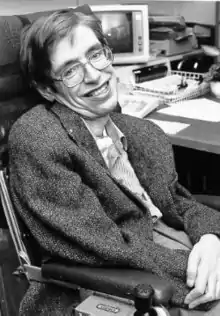
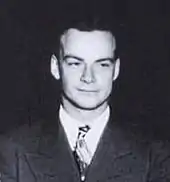
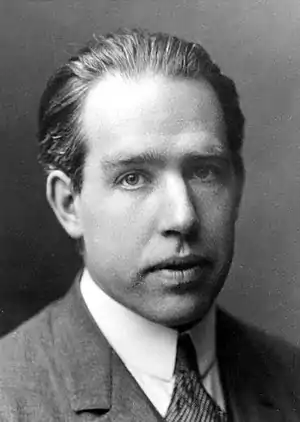


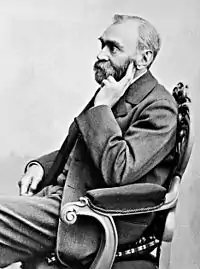
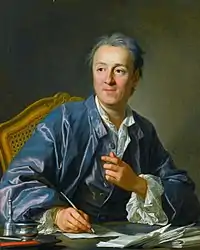
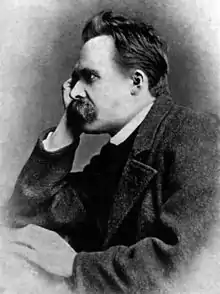

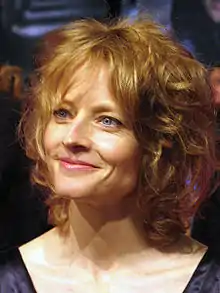


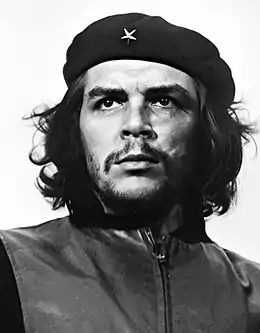

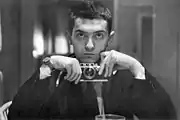
.jpeg.webp)
